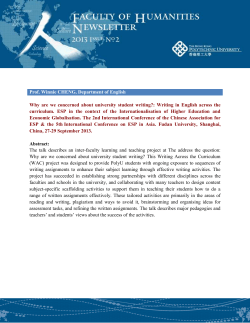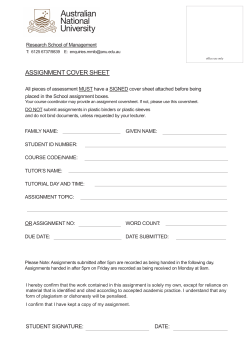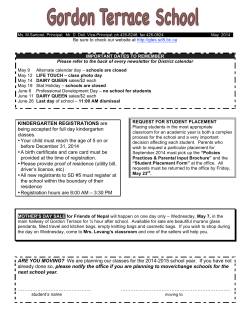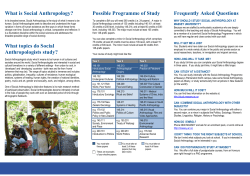
San José State University College of Social Sciences
San José State University College of Social Sciences ANTH 11, Cultural Anthropology, Sec. 03, Fall 2014 Instructor: Nicole Conand Office Location: Clark Hall 463 Telephone: (408) 924-6590 Email: Nicole.Conand@sjsu.edu Office Hours: Tuesday 10:30-11:30 Class Days/Time: Tuesday / Thursday 9:00AM-10:15AM Classroom: Clark Hall 310 GE/SJSU Studies Category: Area D1 Faculty Web Page and MYSJSU Messaging (Optional) Copies of the course syllabus can be found at the Anthropology Department page: http:// www.sjsu.edu/anthropology/resources/greensheetarchive/Fall2014/index.html !Other course materials including major assignments, handouts, etc. may be found on Guadalupe Salazar’s faculty web page at http://www.sjsu.edu/people/guadalupe.salazar. Course Description Cultural anthropology is the study of how humans adapt to, interpret and affect the world in which they live. This course is designed to provide you with an overview to the discipline, as well as an appreciation of what it has meant to be human in different places at different times. By the end of the class, you should have a sense of the anthropological perspective and its merits. After learning some basic concepts and cross-cultural comparisons, we finish the class by showing the practical applications of this perspective in America and elsewhere. Furthermore, you will be gaining first-hand experience in observing the world as an anthropologist, giving you an experiential and intellectual appreciation of a perspective which can be used to better understand a variety of academic, professional, and community contexts. ! The course satisfies requirements for the Human Behavior / D (1) Area in the General Education Core, as well as, departmental and program requirements in anthropology and behavioral science. There are no pre-requisites to this course. Course Learning Objectives Students who satisfactorily complete this course will: !1. Be able to apply appropriately the concept of culture to human behavior. 2. Gain a working knowledge of how cultural anthropologists conduct field research through completing a class project. 3. Be able to recognize and analyze the interaction of social institutions, culture and environment with individual and collective behavior. 4. Develop a cross-cultural perspective on how humans relate to each other and the material world through symbols. !1 5. Have knowledge about several societies in depth using ethnographies. 6. Understand the relevance of cultural anthropology for understanding the complexities of modern life both globally and in this country. Area D1 Human Behavior Student Learning Objective Students will be able to recognize the interaction of social institutions, culture, and environment with the behavior of individuals. Required Texts/Readings 1) 2) 3) 4) Spradley, James and David McCurdy (2012) Conformity and Culture: Readings in Cultural Anthropology (14th Edition) Nanda, Serena & Joan Gregg (2009) Gift of a Bride: A Tale of Anthropology, Matrimony and Murder Stack, Carol (1997) All of Our Kin: Strategies for Survival in a Black Community Lee, Richard B. (2013) The Dobe Ju/’Hoansi (4th Edition) !The books are available through the Spartan Bookstore and Amazon.com. Classroom Protocol • Please do not use your computers during class. Notes should be taken by hand. Exceptions will be made for students with documentation from the Accessible Education Center or with special permission from me. • Please do not use your cell phones or MP3 players for any purpose during class. However, if you are expecting an important call you should notify me so we can make arrangements. • I have a zero-tolerance policy for cheating and plagiarism; if you cheat or plagiarize you will fail the course! Incidences of cheating or plagiarism will be turned into the academic integrity office. Students are responsible for understanding and adhering to the academic integrity policy. • If you miss a class, ask your fellow students for copies of their notes. If you need further help, please come to my office hours. Student Responsibilities • Download the greensheet for this course at the Anthropology Department page here: http:// www.sjsu.edu/anthropology/resources/greensheetarchive/Fall2014/index.html • Download course assignments and study guides on Guadalupe Salazar’s faculty page: http:// www.sjsu.edu/people/guadalupe.salazar. • Students will be informed about changes to the schedule ahead of time. Students are responsible for noting those changes. • Read the guidelines carefully to ensure course assignments are completed according to instructions. • Please write clearly and correctly; seek help if you need it. Please proofread your papers carefully. Reading your work aloud often reveals mistakes in syntax and spelling. • No electronic submission of work – do not email me your papers! • Late papers will only be accepted with permission. Please note: five (5) points will be deducted for each day past the due date. !2 • If you know in advance that you will be unable to attend an exam, it is your responsibility to contact me immediately by either e-mailing, leaving a message for me in the Anthropology Department office, or by coming by during my office hours. Email is the best and fastest way to reach me. • Only students with a documented excuse will be able to take a make-up exam. • Students are responsible for understanding policies about adding, dropping, and incompletes. • Students are responsible for being aware of assignment due dates, midterm dates, and the final exam schedule. • If you have any concerns about your class performance or comprehension, see me in my office hours or schedule an appointment. I am always willing to help students and I care about whether students are grasping the material and enjoying the class. Assignments and Grading Policy Examinations: The exams will consist of multiple choice, True and False, Fill-in the blank and Short Answer questions based on the lectures and readings. !Ethnographic Exercises: These exercises are intended to develop your skills as an observer and interpreter of social life. These out of class exercises are intended to help you understand an ethnographic approach to understanding social phenomena. They will require some work, however, the activities ought to be thought provoking and fun. Instructions for exercises are available on my faculty page. !Homework Assignments: These short assignments engage critical thinking about themes covered in class. Homework Assignments 2, 3, and 4 require that you watch a film (See assignment sheets for assignments). You have several resources to access these films. They are available at the IRC for you to view there. However, to ensure all students have access to the films, they may not be checked out. You may rent the films (iTunes), watch them on Netflix, or on youtube. Be warned, if you opt for the youtube option, the films are posted in several sections. !Grading Distribution Midterms (2 @ 50) 100 points A- to A+ = 260-280 points Ethnographic Exercise (3 @ 30) 90 points B- to B+ = 230-259 points Homework Assignment (4 @ 10) 40 points C- to C+ = 200-229 points Final Exam 50 points D- to D+ = 170-199 points Total 280 points F = below 169 points I assign plus and minus grades at my discretion and use homework assignments and in class participation to adjust marginal grades. ! !3 Departmental Goals_____________________________________ Learn about the goals of the anthropology department and how it can benefit your education. Goals http://www.sjsu.edu/anthropology/departmentinfo/goals/index.html !Credit Hours Success in this course is based on the expectation that students will spend, for each unit of credit, a minimum of forty-five hours over the length of the course (normally 3 hours per unit per week with 1 of the hours used for lecture) for instruction or preparation/studying or course related activities including but not limited to internships, labs, clinical practica. Other course structures will have equivalent workload expectations as described in the syllabus. !! University Policies______________________________________ Here are some of the basic university policies that students must follow. Dropping and Adding Find the procedures and deadlines for adding and dropping classes. Catalog Policies http://info.sjsu.edu/static/catalog/policies.html. Add/drop deadlines http://www.sjsu.edu/provost/services/academic_calendars/ Late Drop Policy http://www.sjsu.edu/aars/policies/latedrops/policy/ Consent for Recording of Class and Public Sharing of Instructor Material All students must obtain the instructor’s permission if they wish to record lectures or distribute materials from the class. University Policy S12-7 http://www.sjsu.edu/senate/docs/S12-7.pdf Academic integrity Learn about the importance of academic honesty and the consequences if it is violated. University Academic Integrity Policy S07-2 http://www.sjsu.edu/senate/docs/S07-2.pdf Student Conduct and Ethical Development website http://www.sjsu.edu/studentconduct/ Campus Policy in Compliance with the American Disabilities Act Here are guidelines to request any course adaptations or accommodations you might need. Presidential Directive 97-03 http://www.sjsu.edu/president/docs/directives/PD_1997-03.pdf Accessible Education Center http://www.sjsu.edu/aec Resources_____________________________________________ The university provides resources that can help you succeed academically. Just look here. Academic Success Center http://www.sjsu.edu/at/asc/ Peer Connections website http://peerconnections.sjsu.edu Writing Center website http://www.sjsu.edu/writingcenter Counseling Services website http://www.sjsu.edu/counseling !4 ANTH 11 (Sec. 04) Fall 2014 Course Schedule Week 1 Date Topics, Readings, Assignments, Deadlines Aug. 26 Introduction !! Class goals and format, review syllabus, add/drop process & deadlines… !The Concept of Culture Aug. 28 Read: S & M, Culture and Ethnography, pp. 2-5 Read: S & M, Ch. 1: Ethnography and Culture Read: S & M, Ch. 2: Eating Christmas in the Kalahari Bring to class: Instructions for Ethnography Exercise 1 2 Sept. 2 N’ai the Story of a !Kung Woman (TU0265A; 58 min) !Sept. 4 Video: !Fieldwork Read: S & M, Ch. 3: Fieldwork on Prostitution in the Era of AIDS Read: S & M, Ch. 4: Nice Girls Don’t Talk to Rastas Read: Stack, pp. 1-31 Homework Assignment 1 Due To learn more: Take ANTH 149 Ethnographic Methods 3 Sept. 9 Language and Communication !! Read: S & M, Language and Communication, pp. 38-40 Read: S & M, Ch. 5: Shakespeare in the Bush !! Read: S & M, Ch. 7: Manipulating Meaning: The Military Name Game !Read: Stack, pp. 32-61 Sept. 11 Video: The Split Horn (XD0916; 58 min.) 4 Sept. 16 Read: S & M, Ch. 8: Conversation Style: Talking on the Job !! Read: Stack, pp. 62-107 Due: Hip Hop: Beyond Beats and Rhymes (XD0703) !Sept. 18 Homework !Kinship and2Family Read: S & M, Kinship and Family, pp. 152-154 Read: S & M, Ch.17: Mother’s Love: Death Without Weeping Video: Kinship and Descent (XB1045A; 30 min.) To learn more: Take Anth 171 Culture Through Film Ethnographic Exercise 1 Due Bring to Class: Instructions for Ethnographic Exercise 2 5 Sept. 23 Read: S & M, Ch. 18: Family and Kinship in Village India !! Read: Stack, pp. 108-129 are Not for Burning (XS0103; 24 min.) !Sept. 25 Video: !All OurBrides Kin !5 Week 6 7 8 Date Sept. 30 Topics, Readings, Assignments, Deadlines !Oct. 2 Midterm 1 Oct. 7 Read: S & M, Ch. 23: Do Muslin Women Really Need Saving? Read: Lee, pp. 1-58 Video: My Journey, My Islam (XS2525; 56 min.) !! !Oct. 9 !Culture and the Individual Read: S & M, Identity, Roles and Groups, pp. 186-188 Read: S & M, Ch. 21: You@Work: Jobs, Identity and the Internet Read: S & M, Ch. 22:The Opt-Out Phenomenon: Women, Work and Identity in America To learn more: Take Anth 25 Human Development, Anth 141 Culture and Gender, Anth 142 Culture and Personality !Culture and Stereotypes Read: S & M, Ch. 24: Mixed Blood Read: Lee, pp. 59-108 Homework Assignment 3 Due: Gypsy Caravan: When the Road Bends Oct. 14 Marriage !! Read: S & M, Ch. 19: Polyandry: When Brothers Take a Wife Read: S & M, Ch. 20: Uterine Families and the Women’s Community !! Read: Lee, pp. 109-140 Bring to class: Instructions for Ethnographic Exercise 3 !! Ethnographic Exercise 2 Due !Video: Love Chronicles: Arranged Marriages (XD1112; 50 min.) Oct. 16 Read: Lee, pp. 141-200 9 Oct. 21 Subsistence Strategies !! Read: S & M, Ecology and Subsistence, pp. 70-72 Read: S & M, Ch. 9: The Hunters: Scarce Resources in the Kalahari !! Read: S & M, Ch. 10: Eskimo Science Video: Patterns of Subsistence (XB1041A; 30 min.) !! To learn more: take Anth 146 Culture and Conflict !Subsistence Exercise Oct. 23 Read: Nanda, pp. 3-67 10 Oct. 28 Cultural Capital Read: Nanda, pp. 68-111 Homework Assignment 4 Due: Nuyorican Dreams !! !Midterm 2 Oct. 30 11 Nov. 4 !! !! !! Nov. 6 Economic Exchange Read: S & M, Economic Systems, pp. 116-118 Read: S & M, Ch. 13: Reciprocity and Power of Giving Read: S & M, Ch. 15: Cocaine and the Economic Deterioration of Bolivia Read: S & M, Ch. 16: Malawi vs. the World Bank Video: Cricket The Trobriand Way (XB1300A; 29 min) !The Penny Game - Bring 16 pennies to class Read: Nanda, pp. 112-161 !6 Week 12 Date Topics, Readings, Assignments, Deadlines Nov. 11 – No Class !Nov. 13 Veteran’s !Religion andDayIdeology Read: S & M, Religion, Magic & World View, pp. 256-259 Read: S & M, Ch. 28: Taraka’s Ghost Read: S & M, Ch. 29: Baseball Magic Video: Religion and Magic (XB1049A; 30 min) To learn more: take Anth 148 Religion and Anthropology ! 13 Nov. 18 !! !! ! Nov. 20 14 Nov. 25 15 Dec. 2 Social Control Read: Nanda, pp. 162-211 Video: Social Control (XB1048B; 30 min) Ethnographic Exercise 3 Due !Globalization Read: S & M: Globalization pp. 294-295 Read: S & M, Ch. 33: Village Walks: Tourism and Globalization Among the Tharu of Nepal Read: S & M, Ch. 35: Global Women in the New Economy Video: Paradise with Side Effects (XD1183; 40 min) Japanese Rock !! Read: S & M, Ch. 32: How Sushi Went Global pp. 212-278 !Nov. 27 Read: !HappyNanda, Thanksgiving! !! Dec. 4 Read: S & M, Ch. 39: Using Anthropology Group Observations 16 Dec. 9 Review and wrap-up Final Exam Friday Dec. 12 2:45 pm – 4:15 pm Clark 204 !Interview exercise ! !7
© Copyright 2025





















